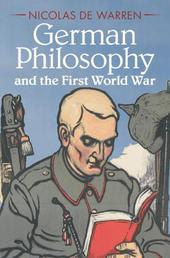
|
German Philosophy and the First World War
Hardback
Main Details
Description
How did the First World War, the so-called 'Great War' - widely seen on all sides as 'the war to end all wars' - impact the development of German philosophy? Combining history and biography with astute philosophical and textual analysis, Nicolas de Warren addresses here the intellectual trajectories of ten significant wartime philosophers: Ernst Bloch, Martin Buber, Ernst Cassirer, Hermann Cohen, Gyoergy Lukacs, Martin Heidegger, Edmund Husserl, Franz Rosenzweig, Max Scheler and Georg Simmel. In exploring their individual works written during and after the War, the author reveals how philosophical concepts and new forms of thinking were forged in response to this unprecedented catastrophe. In reassessing standardized narratives of German thought, the book deepens and enhances our understanding of the intimate and complex relationship between philosophy and violence by demonstrating how the 1914-18 conflict was a crucible for ways of thinking that still define us today.
Author Biography
Nicolas de Warren is Professor of Philosophy and Jewish Studies at Pennsylvania State University. He is the author of Husserl and the Promise of Time (Cambridge University Press, 2010), A Momentary Breathlessness in the Sadness of Time (2018), and Original Forgiveness (2020).
Reviews'These profound reflections on philosophy and the First World War reveal important dimensions of the genealogy of what still drives contemporary philosophy-the continuing resilience of religion in an increasingly secular world, the modern experience of alienation which seems to know no limits, the problems of violence, the question of history, the meaning of the political. This is, in short, a remarkable book.' James Dodd, The New School for Social Research, New York 'World War I, de Warren shows, was a philosophical earthquake. Not only did it transform the philosophers who lived through it, but the war itself acquired a philosophical voice - or, better, voices - that would, for good or ill, echo across twentieth-century thought. Rich in both philosophical and historical insight, German Philosophy and the First World War will remain a touchstone for years to come.' Michael Gubser, James Madison University
|